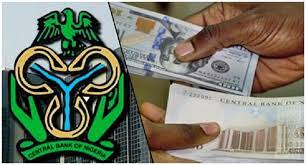The Foreign Exchange (FX) Price Verification System (PVS) is a new website that was recently introduced by the Central Bank of Nigeria (CBN).
This website is intended to provide importers with access to foreign currency.
This notice came from the bank’s Trade and Exchange Department late on the night of Thursday August, 17, 2023.
“Following the successful conduct of the pilot run and various trainings held with all the banks, the Central Bank of Nigeria hereby announces the Go- Live of the Price Verification System (PVS),” CBN remarked.
According to information provided by CBN, beginning on Thursday, August 31, 2023, all Form M requests will be required to include a price verification report that was generated through the portal.
When importing goods into Nigeria, all importers are required by law to fill out and submit a Form M. This form is a mandatory statutory document. It is extendable upon request and has a validity duration of one hundred eighty days for general products and three hundred sixty-five days for plant and machinery.
Read also: CBN makes N103.8 bn profits from Naira reforms
CBN Requirements
The apex bank also noted that all Form M applications must be accompanied by a valid price verification report that was generated via the price verification site. This was a requirement that was placed on all Form M applications.
To clear up any confusion, as of the publication of this circular, the price verification report has transformed into an obligatory commercial document that must be completed before submitting a Form M.
The CBN, on the other hand, has asked all licenced dealers to make sure that their consumers are aware of this change and has noted that any case of infringement will be sanctioned appropriately.
“Please ensure compliance,” it added.
As of June 2023, the Central Bank of the Nation (CBN) implemented a unification of all sectors of the foreign currency (FX) market. This action signified the end of the CBN’s direct control over the forex market.
After the switch, there has been a discernible increase in the rate of fluctuation of the local currency’s exchange rate as the forces of the market exert their impact on pricing.
CBN’s role in volatility
The Central Bank of Nigeria (CBN) announced in July 2023, that it will be intervening in the foreign currency market. Additionally, the CBN has stated that the volatile nature of the market will soon become more manageable.
Folashodun Shonubi, the acting Governor of the Central Bank of Nigeria (CBN), made this statement after the Monetary Policy Committee (MPC) meeting held in Abuja.
“We have started intervening and we’ve been doing it for a while and we will continue to intervene to bring the markets to the levels that we believe it should be.”
“Right now and in the short run, these volatile times are expected but we expect them to moderate sooner rather than later.”
In addition to that, he stated that the Monetary Policy Committee (MPC) increased the Monetary Policy Rate (MPR) from 18.5 percent to 18.75%.
On the day of his inauguration on May 29, 2023, President Bola Tinubu delivered the following speech: “Monetary policy needs a thorough housecleaning. The Central Bank must work towards a unified exchange rate. This will direct funds away from arbitrage into meaningful investment in the plant, equipment, and jobs that power the real economy.”
On June 14, 2023, the Central Bank of Nigeria (CBN) ordered deposit money banks to allow the value of the naira to freely float in relation to the dollar and other international currencies. This came after the CBN eliminated the numerous windows that were used to divide the foreign exchange market.
Instead of the prior practise, in which the CBN dictated rates, buyers and sellers of foreign currency in the official FX market have now been granted permission to quote the exchange rates of their choosing.
When speaking to the media, the acting head of CBN stated: “We are not trying to unify any rate. We believe that we need to encourage the markets to be more efficient and to be more effective, and that takes a bit of time.”
“Some of the volatility you’ve seen over the period has been driven by that same fact that the market needs to find its level and also the reality that there’s pent-up demand which current supply may not be sufficient for and as we ease and satisfy the pent-up demand, we begin to see a more efficient market that runs.”
“We also need to understand the dynamics of pricing in the market. We feel we should actually stop calling it the Investors and Exporters (I&E) widow because it is now much more than the I&E.”
“It’s a market where everybody and anybody through the licensed institutions can participate. So, we expect that over time, sooner rather than later the volatility you are seeing would normalise.”
He admitted that the CBN needs to intervene to keep things at a fair and stable rate.
He concluded: “We have our views as to what that level is and as the market continues to oscillate around that level, if there’s a need for us to intervene either by buying or selling. That’s the role of the central bank.”
